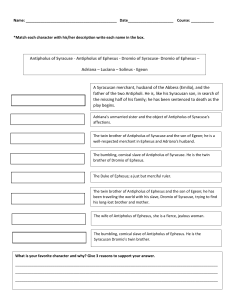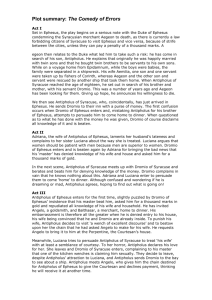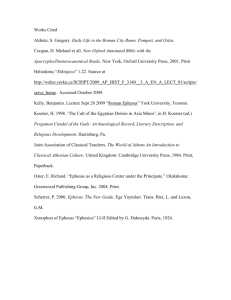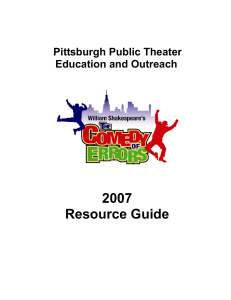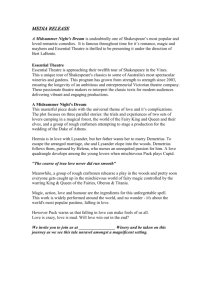The Comedy of Errors
advertisement
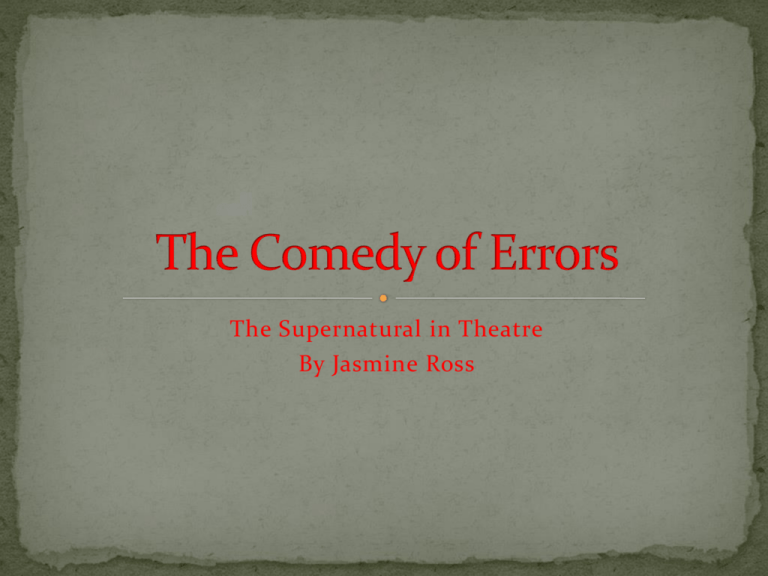
The Supernatural in Theatre By Jasmine Ross Throughout the beginning of The Comedy of Errors,Antipholus of Syracuse is very suspicious that witchcraft is afoot in Ephesus. Copyright Patricia Müller Theme: Connections by Patricia Müller - This blog is hosted at ComfortHost. when Antipholus of Syracuse is met by Dromio of Ephesus who insists that his master come home to dinner, something that Antipholus of Syracuse knows nothing about. Antipholus of Syracuse also accuses Dromio of Ephesus of running away with his money that was supposed to be deposited, and their argument escalates until Antipholus strikes Dromio of Ephesus, who runs away. When Dromio of Syracuse returns, he has no idea what Antipholus of Syracuse is speaking about, leading both men to believe that the city is under a spell. dark.pozadia.org This experience with E. Dromio is S. Antipholus’s first hint that something is amiss in Ephesus. S. Antipholus’ immediate conclusion is that sorcery and witchcraft are to blame. 2007 Yourcompany.com website templates.bz Other Scenes with Witchcraft (1) “Upon my life, by some device or other The villain is o'erraught of all my money. They say this town is full of cozenage; As, nimble jugglers that deceive the eye, Dark-working sorcerers that change the mind, Soul-killing witches that deform the body, Disguised cheaters, prating mountebanks, And many such-like liberties of sin” Again, S. Antipholus is quick to chalk up the strangeness of Adriana knowing he and Dromio’s name to "inspiration" (meaning divination or clairvoyance). This is rather surprising, considering that S. Antipholus did come to Ephesus to look for a twin brother, and, if that were the case, shouldn’t his first assumption be that Adriana is married to his twin? Regardless, S. Antipholus seems to have accepted that he’s come to a magical place. With that premise, nothing that follows seems particularly strange and S. Antipholus has no reason to look for logical answers to the strange situations that befall him. Other scenes with witchcraft(2) “How can she thus, then, call us by our names, Unless it be by inspiration?” S. Antipholus is certain he is dreaming, or was dreaming when he married this woman. This dream-state is an echo of all the supernatural stuff he assumes is afoot in Ephesus. Again S. Antipholus seems to use the supernatural as an excuse to avoid looking at a more complex reality. Other scenes with witchcraft (3) “To me she speaks; she moves me for her theme. What, was I married to her in my dream? Or sleep I now, and think I hear all this? What error drives our eyes and ears amiss? Until I know this sure uncertainty, I'll entertain the offer'd fallacy.” http://www.realbollywood.com Like his master, S. Dromio clearly believes in supernatural forces, but is less comfortable succumbing to sorcery. Rather than let all of this seeming witchcraft roll over him (like S. Antipholus does), S. Dromio cries out and appeals to his rosary (which, if this is set in the pre-Christian era, is one of the play’s many playful anachronisms). How is it that S. Dromio and S. Antipholus believe that sorcery is the cause of their problems in Ephesus but E. Dromio and E. Antipholus never resort to this sort of strange reasoning? Other scenes with witchcraft(4) “O, for my beads! I cross me for sinner. This is the fairy land. O spite of spites! We talk with goblins, owls, and sprites. If we obey them not, this will ensue: They'll suck our breath, or pinch us black and blue.” designyourway.net S. Dromio’s romantic connection with Nell serves as a foil to S. Antipholus’s connection with Luciana. Both feel they’re being bewitched, but while S. Antipholus describes his enchantment in the romantic terms of mermaids and songs, S. Dromio’s enchantment is darker, and involves dogs. It’s a reminder that the supernatural is all about perspective – one man’s evil bewitching is another man’s lovely enchantment. Other scenes with witchcraft(5) “O, Sir, I did not look so low. To conclude: this drudge or diviner laid claim to me; call'd me Dromio; swore I was assur'd to her; told me what privy marks I had about me, as, the mark of my shoulder, the mole in my neck, the great wart on my left arm, that I, amaz'd, ran from her as a witch. And, I think, if my breast had not been made of faith, and my heart of steel, She had transform'd me to a curtal dog, and made me turn i' th' wheel.” Enchantment.com Antipholus shows some strength of spirit by choosing not to bask in the good treatment he’s been getting in Ephesus. Though he’s being treated kindly, it doesn’t sit well with him that people really seem to think he is who he’s not. Even if the seeming magic at hand has good consequences, it’s still not real, so he chooses to reject it. josephnewton.com Other scenes with witchcraft(6) “Even now a tailor call'd me in his shop, and show'd me silks that he had bought for me, And therewithal took measure of my body. Sure, these are but imaginary wiles, And Lapland sorcerers inhabit here.” ADRIANA : “Good Doctor Pinch, you are a conjurer: Establish him in his true sense again, And I will please you what you will demand.” LUCIANA:” Alas, how fiery and how sharp he looks!” COURTEZAN: “Mark how he trembles in his ecstasy.” PINCH: “Give me your hand, and let me feel your pulse. E. ANTIPHOLUS: “There is my hand, and let it feel your ear.” [Striking him] PINCH: “I charge thee, Satan, hous'd within this man, To yield possession to my holy prayers, And to thy state of darkness hie thee straight. I conjure thee by all the saints in heaven.” This is all rather hilarious. Throughout the entire play, the supernatural has seemed a dark and mysterious force in Ephesus, but actually, when this guy who’s supposed to be a conjurer shows up, he’s clearly viewed as an innocuous old quack. Adriana seems as foolish as S. Antipholus to believe in all of this stuff, and though Pinch takes himself very seriously, that’s all the more reason we don’t take him seriously. In case it wasn’t clear before, Pinch’s character shows us that relying on explanations like magic is ludicrous. Also, this is where E. Antipholus finally smacks around somebody that deserves it. clipartillustration.com Again we see there are many sides to the supernatural – the Abbess equates her holy prayers with her wholesome syrups. This whole healing of madness is all a matter of perspective, whether done by a witch doctor, a wife, or a holy woman. Other scenes with witchcraft(7) “Be patient; for I will not let him stir Till I have us'd the approved means I have, with wholesome syrups, drugs, and holy prayers, to make of him a formal man again. It is a branch and parcel of mine oath, a charitable duty of my order; therefore depart, and leave him here with me.” holydevotions.blogspot.com Shakespeare’s play Macbeth is said to be cursed, so actors avoid saying its name (the euphuism "The Scottish Play" is used instead). Actors also avoid even quoting the lines from Macbeth inside a theatre, particularly the Witches' incantations. Outside of a theatre the play can be spoken of openly. If an actor speaks the name Macbeth in a theatre, he or she is required to leave the theatre building, spin around three times, spit, curse, and then knock to be allowed back in. theatregeeks.com There are several possible origins for this superstition. One is the assumption that the song of the Weird Sisters is an actual spell that will bring about evil spirits. Another is that there is more swordplay in it than most other Shakespeare plays, and the more swordplay must be rehearsed and performed, the more chances there are for someone to get injured. Yet another option is that the play is often run by theatres that are in debt and looking to increase patronage. matthewholtzclaw.com Generally, it is considered bad luck to wish someone good luck in a theatre. Prior to performances, it is traditional for the cast to gather together to avert the bad luck by wishing each other bad luck or cursing. academiclink.stevensonuniversity.org In English-speaking countries, the expression “break a leg” replaces the phrase “good luck”, which is considered unlucky. Recently, the term "chookas" has also come into use, replacing "good luck". The expression is sometimes used outside the theatre, as superstitions and customs travel through other professions and then into common use. If someone says "good luck", they must go out of the theatre, turn around 3 times, spit, curse, then knock on the door and ask to be readmitted to the theatre. robertronnes.com One ghost-related superstition is that the theatre should always be closed one night a week to give the ghosts a chance to perform their own plays. This is traditionally on Monday nights, conveniently giving actors a day off after weekend performances. Theatres that have stood for more than a few decades tend to have lots of associated ghost stories, more than other public buildings of similar age. ghosttheory.com Not surprisingly, given the number of things that can go wrong, sometimes with no apparent logical cause, theatre folk often are a superstitious lot. Superstitions aren't limited to the theatre, of course. thesbians.blogspot.com Undoubtedly you’ve heard of athletes who feel they absolutely must always wear a given article of clothing or they’ll have a bad game. For example, Jack Nickalausmust carry three pennies with him every time he plays golf, Babe Ruth had to touch first base with his foot on the way to the outfield, and race-car driver Rick Mears refuses to allow peanuts near his car. auntiestreasures.com Surely we all have our personal superstitions about avoiding walking under ladders, not stepping on a sidewalk’s crack, and changing direction so the black cat does not cross our paths. And as for breaking a mirror--of course we know that means seven years of bad luck! hopelessromantic.com For many of us, there’s a comfort in the ritual of superstition. Perhaps the logical part of your brain tells you there’s no magic in the first star you see at night but your heart encourages you to say, “Star light, star bright, first star I see tonight, I wish I may, I wish I might....” Not only is there comfort, we are happy that our art has interesting quirks. pastorcraigsermonblog.blogspot.com falconlit.com grandlakebusinessjournal.com grandlakebusinessjournal.com doitincolumbia.com doitincolumbia.com Andrews, John. Concise Dictionary of British Literary Biography, Volume 1: Writers of the middle Ages and Renaissance before 1660, Gale, 1992, pp. 251-337. Fletcher, Martha. “A Short History of the Drama”. Bellinger, New York. Henry Holt& Company. 1927, p.224-6, 234. Lablanc L., Micheal. Shakespearean Criticism. Gale Research Co., 2003 Miola S., Robert. “The Comedy of Errors Critical Essays”. Library of Congress Cataloging-inPublicaton Data. 1997 Papatola P., Dominic. “Theater review: Few Errors, Plenty of Comedy in Acting Company Productions” Pioneer Press, 2011 Rolfe J., William “The Comedy of Errors: The History of the Play” New York Harper & Brothers (1894) Shakespeare, William. “The Comedy of Errors” Public Domain. 1594 Shakespeare , William. “Exploring Shakespeare” Online ed. Detroit: Gale, 2003 Snider J., Denton. System of Shakespeare’s Dramas. GI Jones and co. 1877 p.370-82. Latham Collin, Looking at Shakespeare, Chicago times, 1975
